Employability Skills: Theories and Self-Assessment
VerifiedAdded on 2021/04/24
|7
|1485
|53
Homework Assignment
AI Summary
This assignment delves into the realm of employability skills, focusing on self-assessment and career development. The student has undertaken the Gallup Strengthsfinder test, identifying key behavioral attributes such as "Includer," "Futuristic," "Learner," "Communication," and "Belief." The assignment explores two prominent theories: the Gallup Strengths theory, which emphasizes identifying and utilizing individual strengths, and the Johari Window theory, which aids in understanding self-awareness and interpersonal relationships. Through journal entries, the student reflects on these theories, applying them to their future career development, particularly in the context of aspiring to a managerial role in a multinational organization. The student also identifies areas for improvement, such as time and conflict management. The assignment concludes with a reflection on how these theories contribute to the student's understanding of their strengths, weaknesses, and potential for professional growth, supported by relevant academic references.
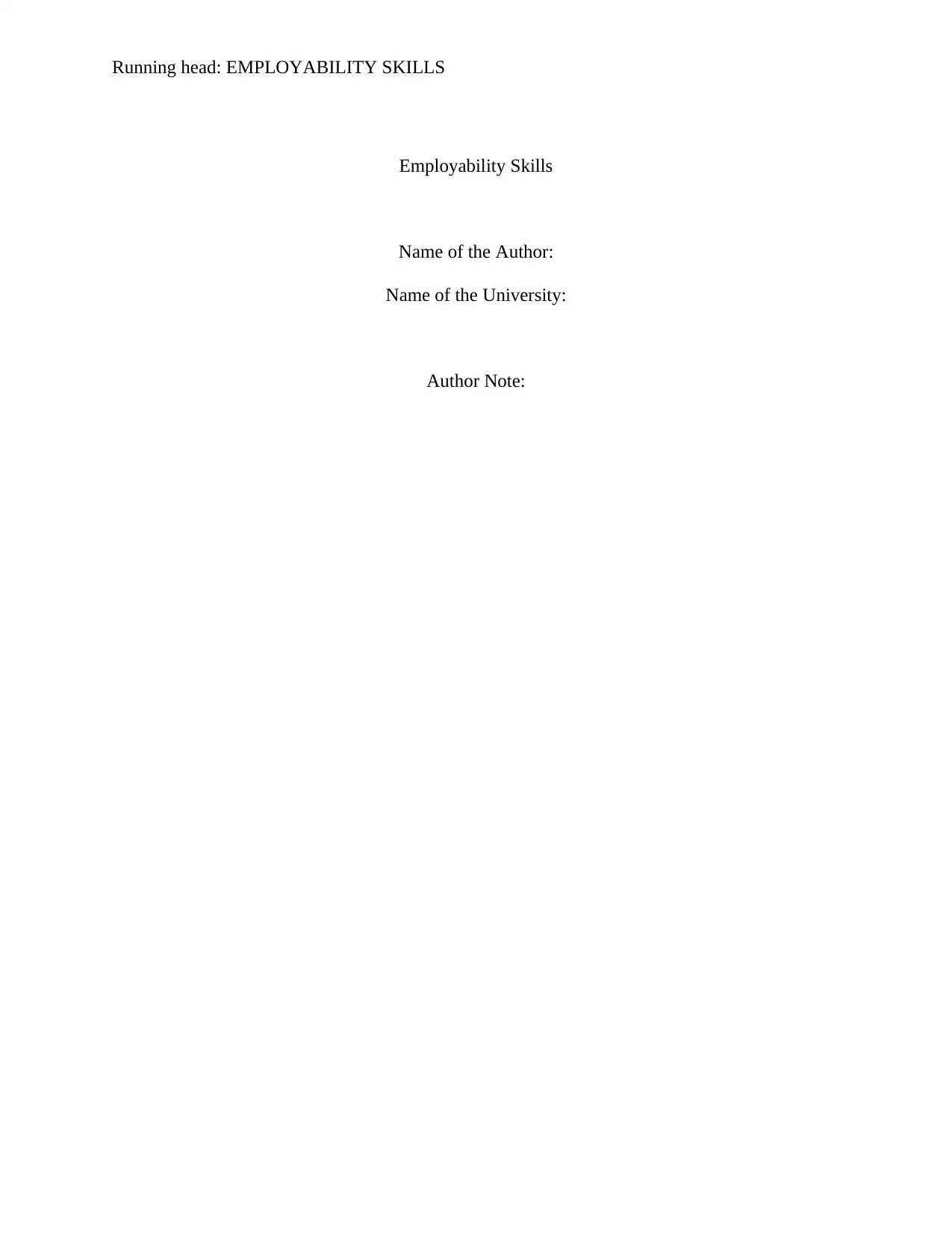
Running head: EMPLOYABILITY SKILLS
Employability Skills
Name of the Author:
Name of the University:
Author Note:
Employability Skills
Name of the Author:
Name of the University:
Author Note:
Paraphrase This Document
Need a fresh take? Get an instant paraphrase of this document with our AI Paraphraser
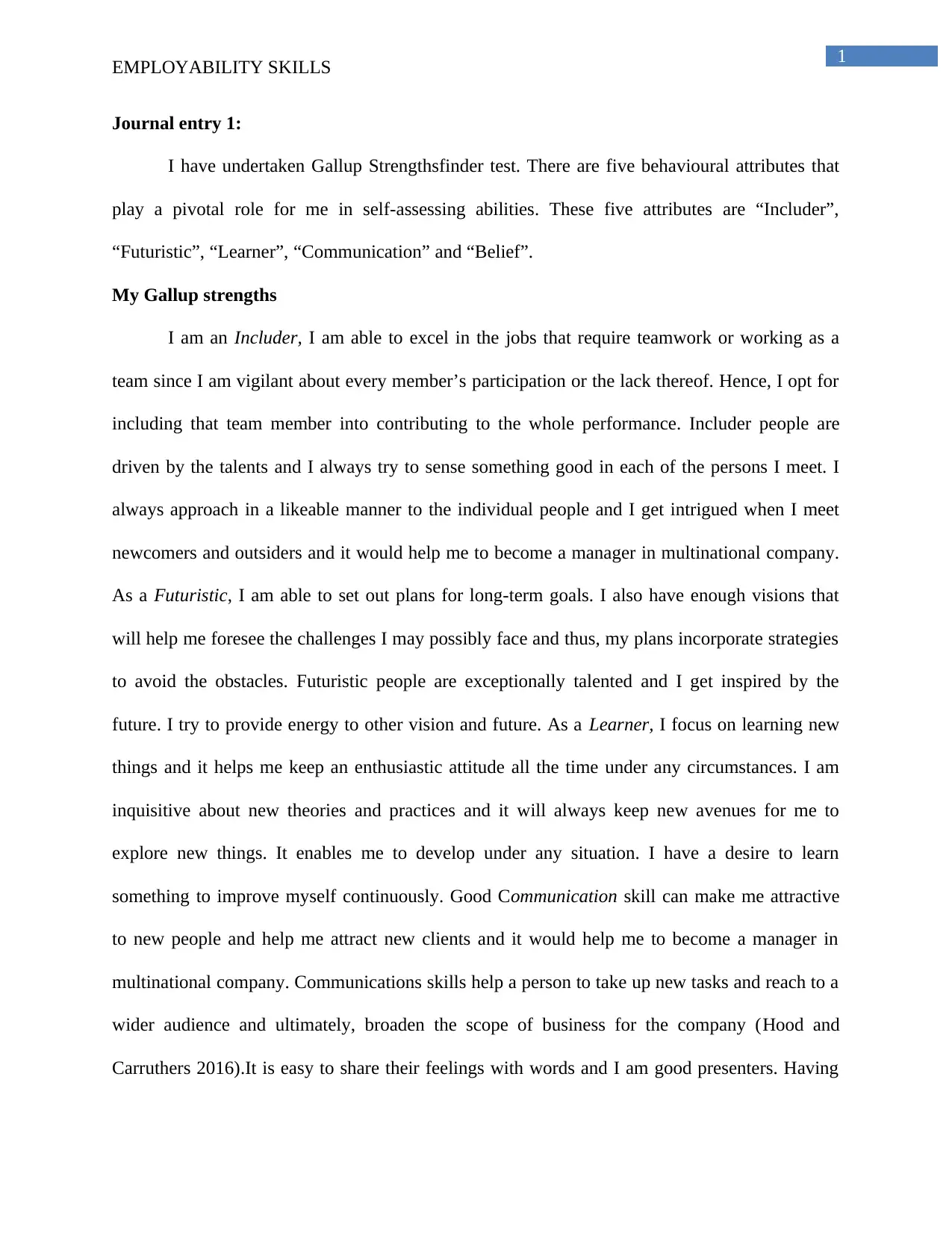
1
EMPLOYABILITY SKILLS
Journal entry 1:
I have undertaken Gallup Strengthsfinder test. There are five behavioural attributes that
play a pivotal role for me in self-assessing abilities. These five attributes are “Includer”,
“Futuristic”, “Learner”, “Communication” and “Belief”.
My Gallup strengths
I am an Includer, I am able to excel in the jobs that require teamwork or working as a
team since I am vigilant about every member’s participation or the lack thereof. Hence, I opt for
including that team member into contributing to the whole performance. Includer people are
driven by the talents and I always try to sense something good in each of the persons I meet. I
always approach in a likeable manner to the individual people and I get intrigued when I meet
newcomers and outsiders and it would help me to become a manager in multinational company.
As a Futuristic, I am able to set out plans for long-term goals. I also have enough visions that
will help me foresee the challenges I may possibly face and thus, my plans incorporate strategies
to avoid the obstacles. Futuristic people are exceptionally talented and I get inspired by the
future. I try to provide energy to other vision and future. As a Learner, I focus on learning new
things and it helps me keep an enthusiastic attitude all the time under any circumstances. I am
inquisitive about new theories and practices and it will always keep new avenues for me to
explore new things. It enables me to develop under any situation. I have a desire to learn
something to improve myself continuously. Good Communication skill can make me attractive
to new people and help me attract new clients and it would help me to become a manager in
multinational company. Communications skills help a person to take up new tasks and reach to a
wider audience and ultimately, broaden the scope of business for the company (Hood and
Carruthers 2016).It is easy to share their feelings with words and I am good presenters. Having
EMPLOYABILITY SKILLS
Journal entry 1:
I have undertaken Gallup Strengthsfinder test. There are five behavioural attributes that
play a pivotal role for me in self-assessing abilities. These five attributes are “Includer”,
“Futuristic”, “Learner”, “Communication” and “Belief”.
My Gallup strengths
I am an Includer, I am able to excel in the jobs that require teamwork or working as a
team since I am vigilant about every member’s participation or the lack thereof. Hence, I opt for
including that team member into contributing to the whole performance. Includer people are
driven by the talents and I always try to sense something good in each of the persons I meet. I
always approach in a likeable manner to the individual people and I get intrigued when I meet
newcomers and outsiders and it would help me to become a manager in multinational company.
As a Futuristic, I am able to set out plans for long-term goals. I also have enough visions that
will help me foresee the challenges I may possibly face and thus, my plans incorporate strategies
to avoid the obstacles. Futuristic people are exceptionally talented and I get inspired by the
future. I try to provide energy to other vision and future. As a Learner, I focus on learning new
things and it helps me keep an enthusiastic attitude all the time under any circumstances. I am
inquisitive about new theories and practices and it will always keep new avenues for me to
explore new things. It enables me to develop under any situation. I have a desire to learn
something to improve myself continuously. Good Communication skill can make me attractive
to new people and help me attract new clients and it would help me to become a manager in
multinational company. Communications skills help a person to take up new tasks and reach to a
wider audience and ultimately, broaden the scope of business for the company (Hood and
Carruthers 2016).It is easy to share their feelings with words and I am good presenters. Having
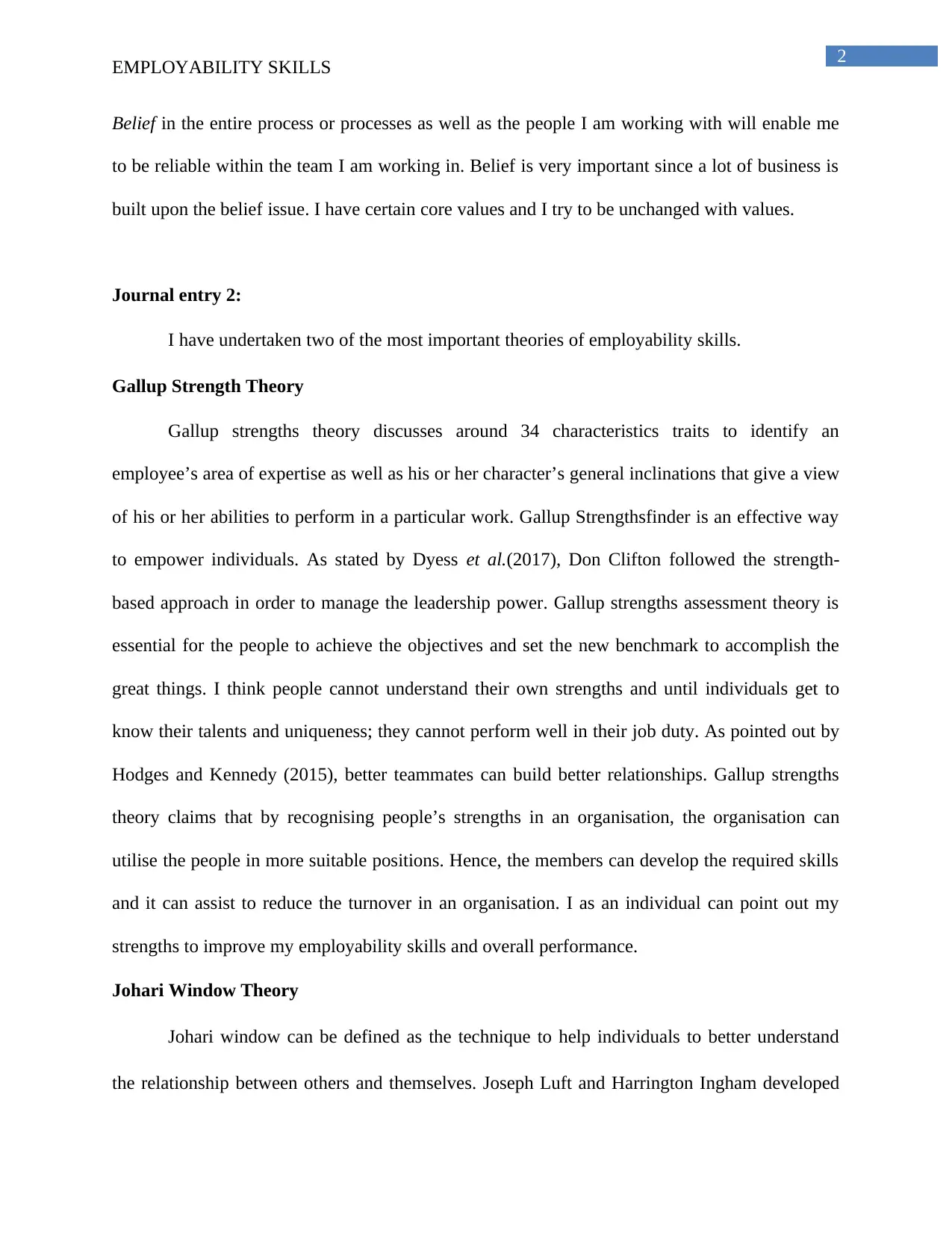
2
EMPLOYABILITY SKILLS
Belief in the entire process or processes as well as the people I am working with will enable me
to be reliable within the team I am working in. Belief is very important since a lot of business is
built upon the belief issue. I have certain core values and I try to be unchanged with values.
Journal entry 2:
I have undertaken two of the most important theories of employability skills.
Gallup Strength Theory
Gallup strengths theory discusses around 34 characteristics traits to identify an
employee’s area of expertise as well as his or her character’s general inclinations that give a view
of his or her abilities to perform in a particular work. Gallup Strengthsfinder is an effective way
to empower individuals. As stated by Dyess et al.(2017), Don Clifton followed the strength-
based approach in order to manage the leadership power. Gallup strengths assessment theory is
essential for the people to achieve the objectives and set the new benchmark to accomplish the
great things. I think people cannot understand their own strengths and until individuals get to
know their talents and uniqueness; they cannot perform well in their job duty. As pointed out by
Hodges and Kennedy (2015), better teammates can build better relationships. Gallup strengths
theory claims that by recognising people’s strengths in an organisation, the organisation can
utilise the people in more suitable positions. Hence, the members can develop the required skills
and it can assist to reduce the turnover in an organisation. I as an individual can point out my
strengths to improve my employability skills and overall performance.
Johari Window Theory
Johari window can be defined as the technique to help individuals to better understand
the relationship between others and themselves. Joseph Luft and Harrington Ingham developed
EMPLOYABILITY SKILLS
Belief in the entire process or processes as well as the people I am working with will enable me
to be reliable within the team I am working in. Belief is very important since a lot of business is
built upon the belief issue. I have certain core values and I try to be unchanged with values.
Journal entry 2:
I have undertaken two of the most important theories of employability skills.
Gallup Strength Theory
Gallup strengths theory discusses around 34 characteristics traits to identify an
employee’s area of expertise as well as his or her character’s general inclinations that give a view
of his or her abilities to perform in a particular work. Gallup Strengthsfinder is an effective way
to empower individuals. As stated by Dyess et al.(2017), Don Clifton followed the strength-
based approach in order to manage the leadership power. Gallup strengths assessment theory is
essential for the people to achieve the objectives and set the new benchmark to accomplish the
great things. I think people cannot understand their own strengths and until individuals get to
know their talents and uniqueness; they cannot perform well in their job duty. As pointed out by
Hodges and Kennedy (2015), better teammates can build better relationships. Gallup strengths
theory claims that by recognising people’s strengths in an organisation, the organisation can
utilise the people in more suitable positions. Hence, the members can develop the required skills
and it can assist to reduce the turnover in an organisation. I as an individual can point out my
strengths to improve my employability skills and overall performance.
Johari Window Theory
Johari window can be defined as the technique to help individuals to better understand
the relationship between others and themselves. Joseph Luft and Harrington Ingham developed
⊘ This is a preview!⊘
Do you want full access?
Subscribe today to unlock all pages.

Trusted by 1+ million students worldwide
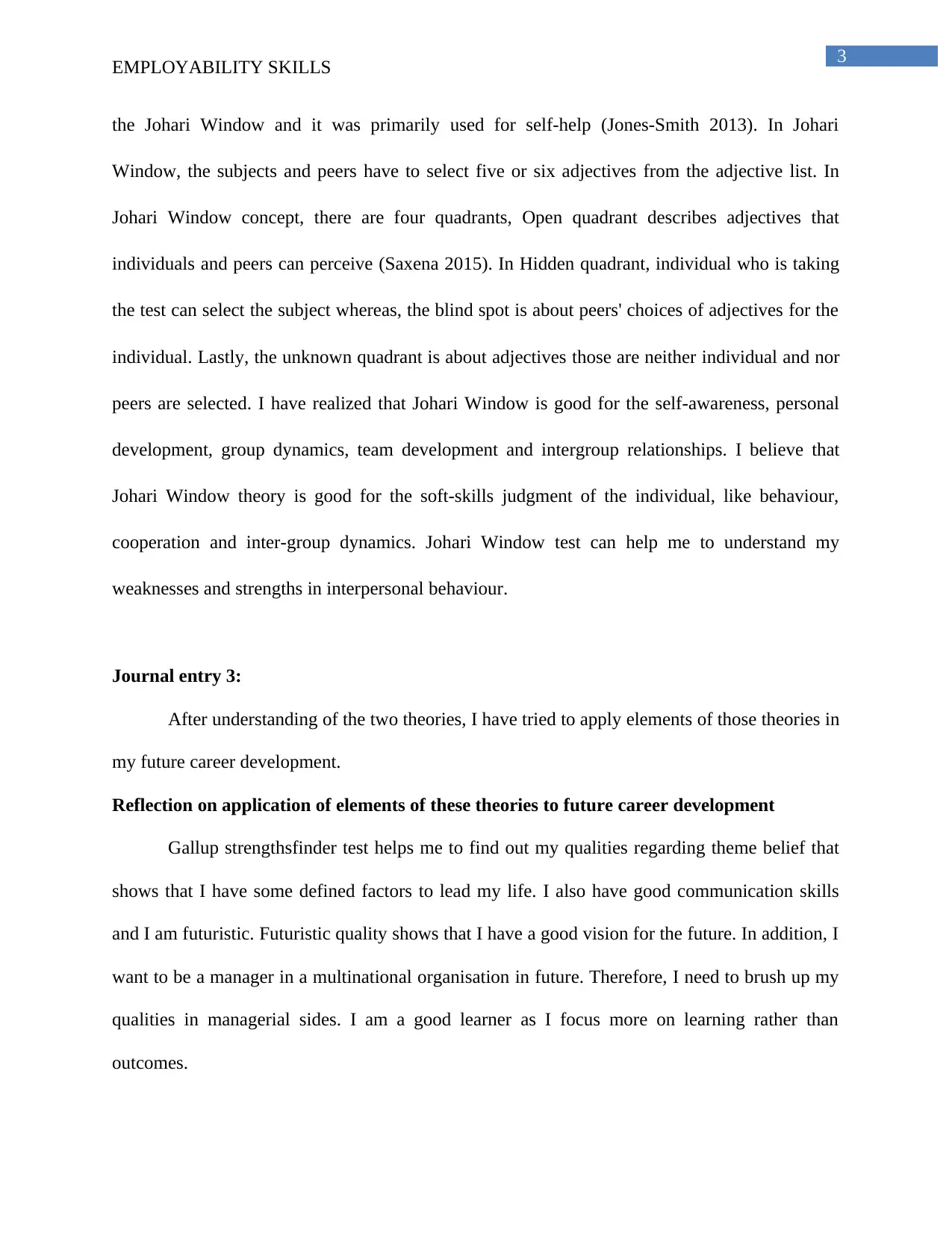
3
EMPLOYABILITY SKILLS
the Johari Window and it was primarily used for self-help (Jones-Smith 2013). In Johari
Window, the subjects and peers have to select five or six adjectives from the adjective list. In
Johari Window concept, there are four quadrants, Open quadrant describes adjectives that
individuals and peers can perceive (Saxena 2015). In Hidden quadrant, individual who is taking
the test can select the subject whereas, the blind spot is about peers' choices of adjectives for the
individual. Lastly, the unknown quadrant is about adjectives those are neither individual and nor
peers are selected. I have realized that Johari Window is good for the self-awareness, personal
development, group dynamics, team development and intergroup relationships. I believe that
Johari Window theory is good for the soft-skills judgment of the individual, like behaviour,
cooperation and inter-group dynamics. Johari Window test can help me to understand my
weaknesses and strengths in interpersonal behaviour.
Journal entry 3:
After understanding of the two theories, I have tried to apply elements of those theories in
my future career development.
Reflection on application of elements of these theories to future career development
Gallup strengthsfinder test helps me to find out my qualities regarding theme belief that
shows that I have some defined factors to lead my life. I also have good communication skills
and I am futuristic. Futuristic quality shows that I have a good vision for the future. In addition, I
want to be a manager in a multinational organisation in future. Therefore, I need to brush up my
qualities in managerial sides. I am a good learner as I focus more on learning rather than
outcomes.
EMPLOYABILITY SKILLS
the Johari Window and it was primarily used for self-help (Jones-Smith 2013). In Johari
Window, the subjects and peers have to select five or six adjectives from the adjective list. In
Johari Window concept, there are four quadrants, Open quadrant describes adjectives that
individuals and peers can perceive (Saxena 2015). In Hidden quadrant, individual who is taking
the test can select the subject whereas, the blind spot is about peers' choices of adjectives for the
individual. Lastly, the unknown quadrant is about adjectives those are neither individual and nor
peers are selected. I have realized that Johari Window is good for the self-awareness, personal
development, group dynamics, team development and intergroup relationships. I believe that
Johari Window theory is good for the soft-skills judgment of the individual, like behaviour,
cooperation and inter-group dynamics. Johari Window test can help me to understand my
weaknesses and strengths in interpersonal behaviour.
Journal entry 3:
After understanding of the two theories, I have tried to apply elements of those theories in
my future career development.
Reflection on application of elements of these theories to future career development
Gallup strengthsfinder test helps me to find out my qualities regarding theme belief that
shows that I have some defined factors to lead my life. I also have good communication skills
and I am futuristic. Futuristic quality shows that I have a good vision for the future. In addition, I
want to be a manager in a multinational organisation in future. Therefore, I need to brush up my
qualities in managerial sides. I am a good learner as I focus more on learning rather than
outcomes.
Paraphrase This Document
Need a fresh take? Get an instant paraphrase of this document with our AI Paraphraser
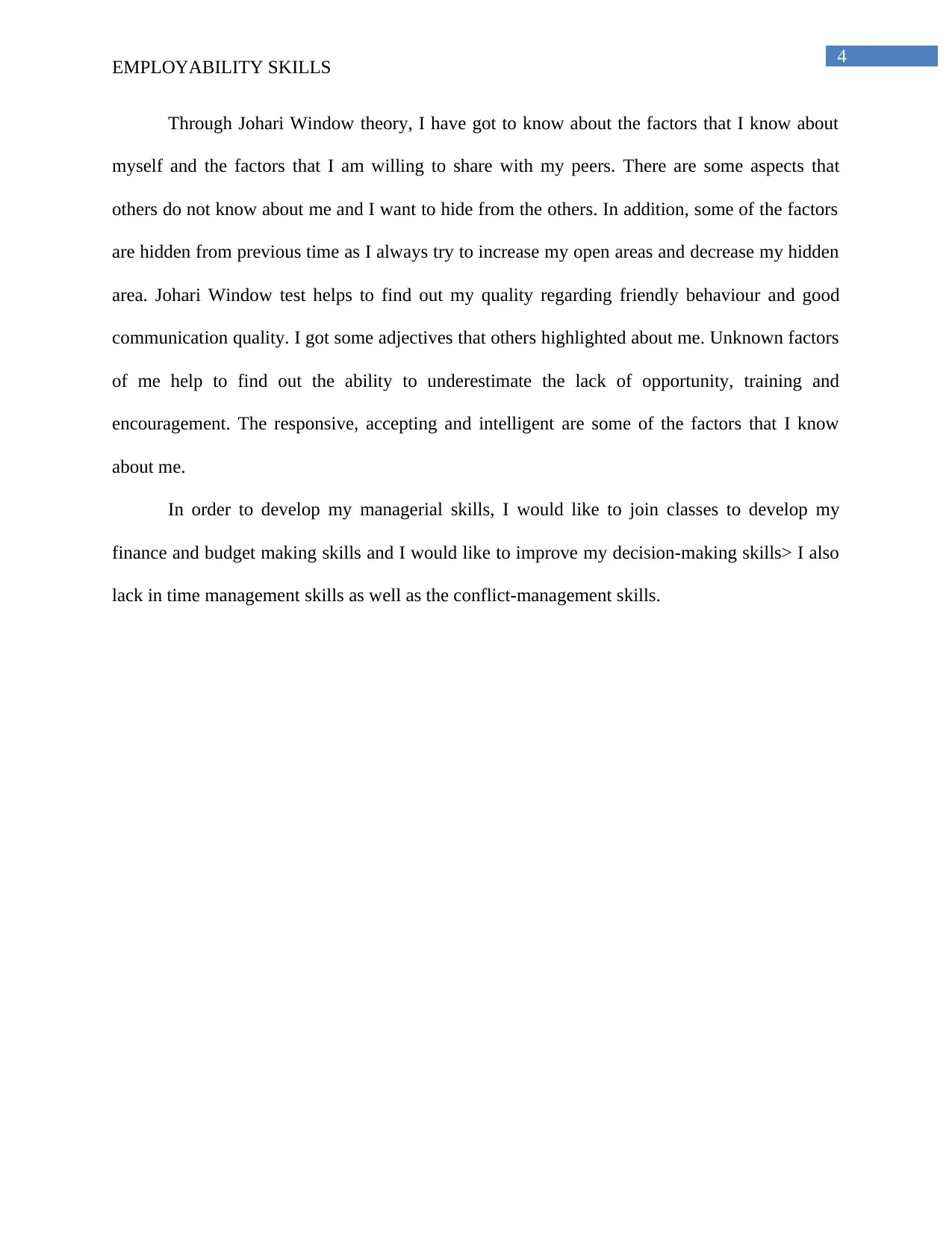
4
EMPLOYABILITY SKILLS
Through Johari Window theory, I have got to know about the factors that I know about
myself and the factors that I am willing to share with my peers. There are some aspects that
others do not know about me and I want to hide from the others. In addition, some of the factors
are hidden from previous time as I always try to increase my open areas and decrease my hidden
area. Johari Window test helps to find out my quality regarding friendly behaviour and good
communication quality. I got some adjectives that others highlighted about me. Unknown factors
of me help to find out the ability to underestimate the lack of opportunity, training and
encouragement. The responsive, accepting and intelligent are some of the factors that I know
about me.
In order to develop my managerial skills, I would like to join classes to develop my
finance and budget making skills and I would like to improve my decision-making skills> I also
lack in time management skills as well as the conflict-management skills.
EMPLOYABILITY SKILLS
Through Johari Window theory, I have got to know about the factors that I know about
myself and the factors that I am willing to share with my peers. There are some aspects that
others do not know about me and I want to hide from the others. In addition, some of the factors
are hidden from previous time as I always try to increase my open areas and decrease my hidden
area. Johari Window test helps to find out my quality regarding friendly behaviour and good
communication quality. I got some adjectives that others highlighted about me. Unknown factors
of me help to find out the ability to underestimate the lack of opportunity, training and
encouragement. The responsive, accepting and intelligent are some of the factors that I know
about me.
In order to develop my managerial skills, I would like to join classes to develop my
finance and budget making skills and I would like to improve my decision-making skills> I also
lack in time management skills as well as the conflict-management skills.
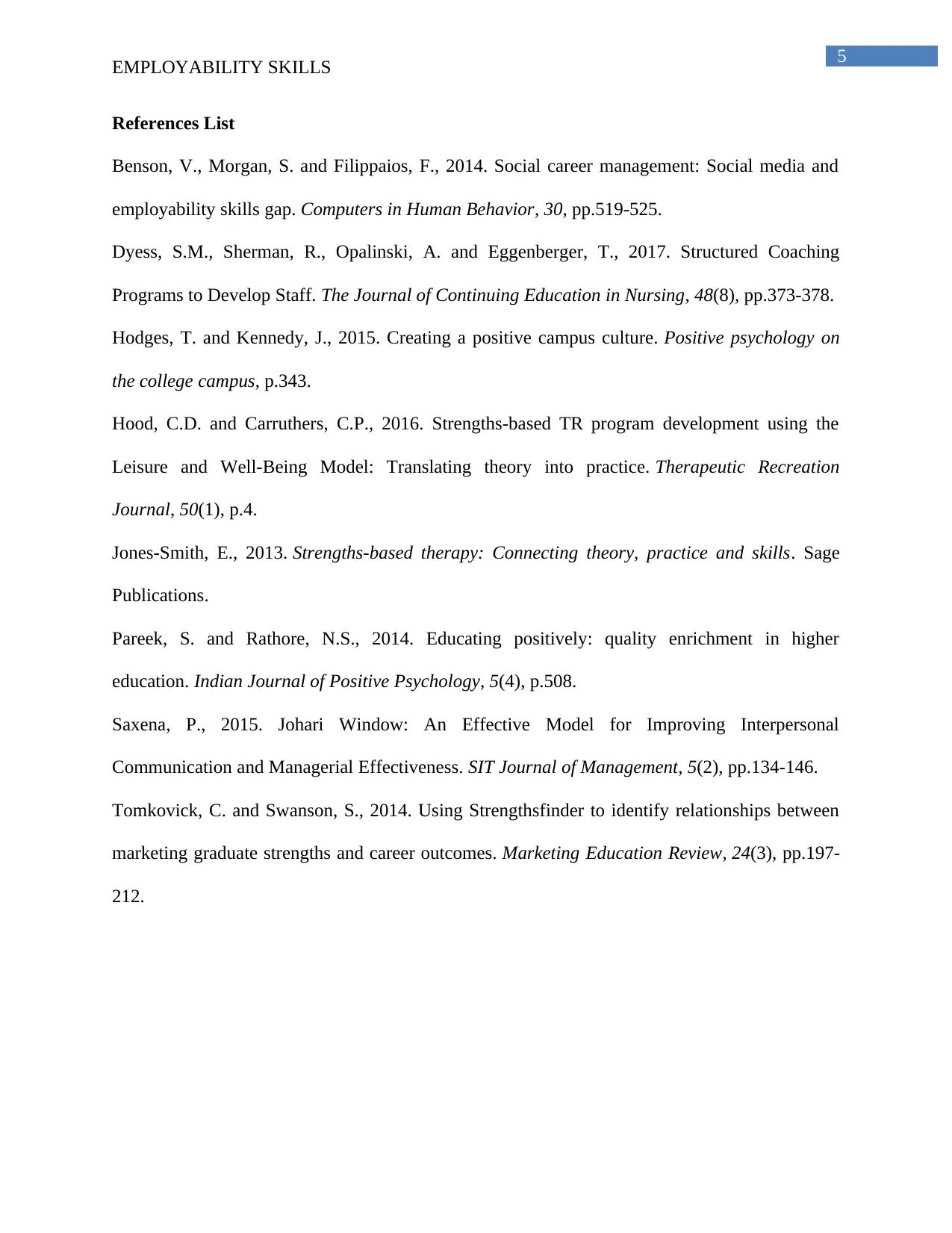
5
EMPLOYABILITY SKILLS
References List
Benson, V., Morgan, S. and Filippaios, F., 2014. Social career management: Social media and
employability skills gap. Computers in Human Behavior, 30, pp.519-525.
Dyess, S.M., Sherman, R., Opalinski, A. and Eggenberger, T., 2017. Structured Coaching
Programs to Develop Staff. The Journal of Continuing Education in Nursing, 48(8), pp.373-378.
Hodges, T. and Kennedy, J., 2015. Creating a positive campus culture. Positive psychology on
the college campus, p.343.
Hood, C.D. and Carruthers, C.P., 2016. Strengths-based TR program development using the
Leisure and Well-Being Model: Translating theory into practice. Therapeutic Recreation
Journal, 50(1), p.4.
Jones-Smith, E., 2013. Strengths-based therapy: Connecting theory, practice and skills. Sage
Publications.
Pareek, S. and Rathore, N.S., 2014. Educating positively: quality enrichment in higher
education. Indian Journal of Positive Psychology, 5(4), p.508.
Saxena, P., 2015. Johari Window: An Effective Model for Improving Interpersonal
Communication and Managerial Effectiveness. SIT Journal of Management, 5(2), pp.134-146.
Tomkovick, C. and Swanson, S., 2014. Using Strengthsfinder to identify relationships between
marketing graduate strengths and career outcomes. Marketing Education Review, 24(3), pp.197-
212.
EMPLOYABILITY SKILLS
References List
Benson, V., Morgan, S. and Filippaios, F., 2014. Social career management: Social media and
employability skills gap. Computers in Human Behavior, 30, pp.519-525.
Dyess, S.M., Sherman, R., Opalinski, A. and Eggenberger, T., 2017. Structured Coaching
Programs to Develop Staff. The Journal of Continuing Education in Nursing, 48(8), pp.373-378.
Hodges, T. and Kennedy, J., 2015. Creating a positive campus culture. Positive psychology on
the college campus, p.343.
Hood, C.D. and Carruthers, C.P., 2016. Strengths-based TR program development using the
Leisure and Well-Being Model: Translating theory into practice. Therapeutic Recreation
Journal, 50(1), p.4.
Jones-Smith, E., 2013. Strengths-based therapy: Connecting theory, practice and skills. Sage
Publications.
Pareek, S. and Rathore, N.S., 2014. Educating positively: quality enrichment in higher
education. Indian Journal of Positive Psychology, 5(4), p.508.
Saxena, P., 2015. Johari Window: An Effective Model for Improving Interpersonal
Communication and Managerial Effectiveness. SIT Journal of Management, 5(2), pp.134-146.
Tomkovick, C. and Swanson, S., 2014. Using Strengthsfinder to identify relationships between
marketing graduate strengths and career outcomes. Marketing Education Review, 24(3), pp.197-
212.
⊘ This is a preview!⊘
Do you want full access?
Subscribe today to unlock all pages.

Trusted by 1+ million students worldwide
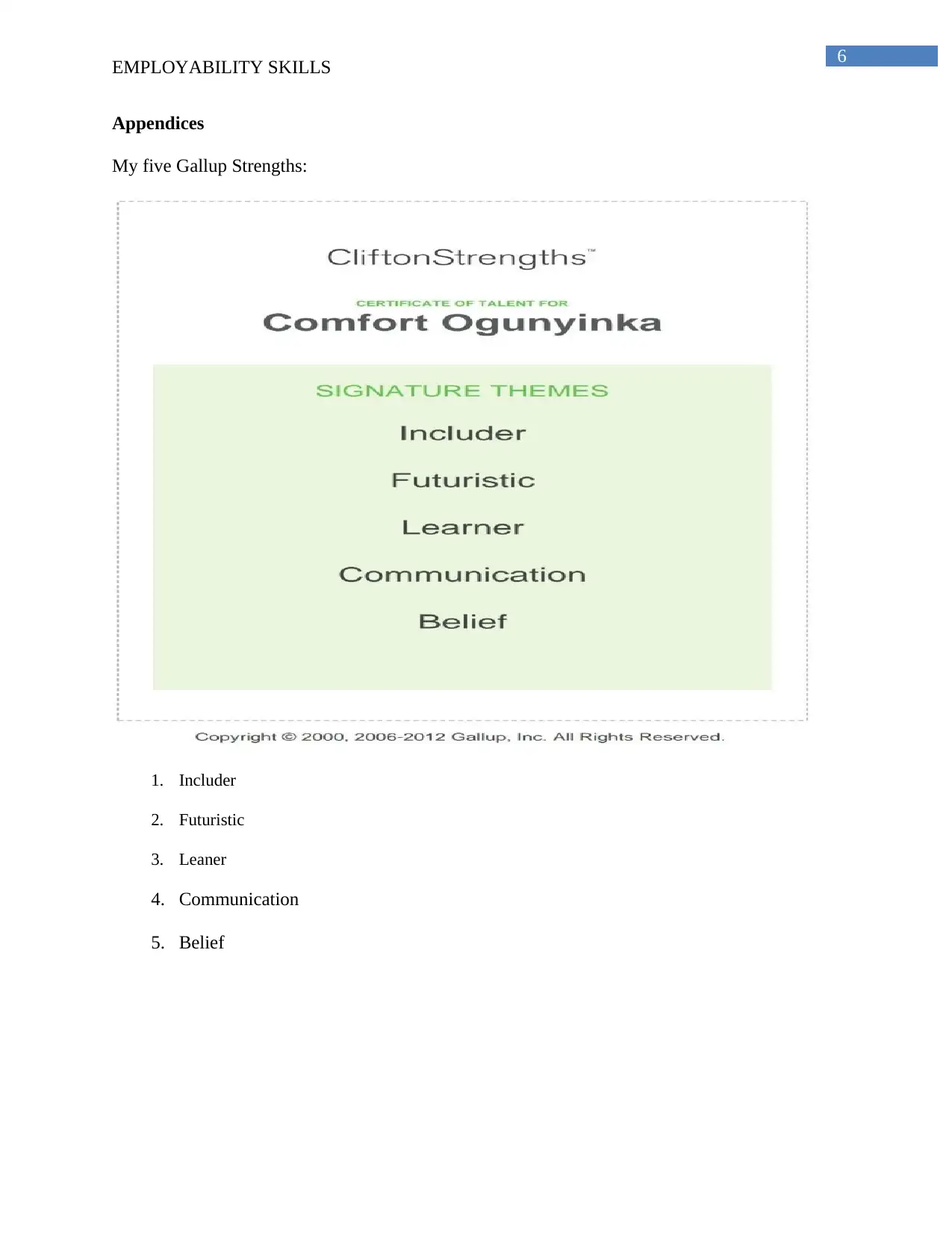
6
EMPLOYABILITY SKILLS
Appendices
My five Gallup Strengths:
1. Includer
2. Futuristic
3. Leaner
4. Communication
5. Belief
EMPLOYABILITY SKILLS
Appendices
My five Gallup Strengths:
1. Includer
2. Futuristic
3. Leaner
4. Communication
5. Belief
1 out of 7
Related Documents
Your All-in-One AI-Powered Toolkit for Academic Success.
+13062052269
info@desklib.com
Available 24*7 on WhatsApp / Email
![[object Object]](/_next/static/media/star-bottom.7253800d.svg)
Unlock your academic potential
Copyright © 2020–2026 A2Z Services. All Rights Reserved. Developed and managed by ZUCOL.





